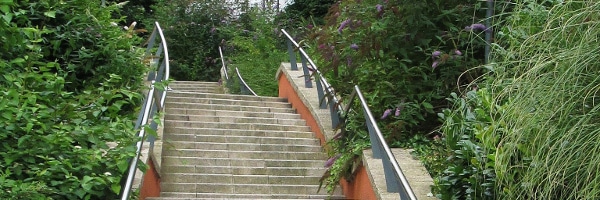I still remember the first time I stood in front of a crowd of about 35 people, including my brand new lab mates and professors, in my first ever lab meeting. My feet were as wobbly as ever, and all I wanted was a big boulder to hide behind, so my crazy, shaky legs would not be seen in public.
My hands, which are normally quite helpful appendages in daily life, were quite uncooperatively holding the laser pointer, all sweaty and refusing to keep still. It was a new terrain, with new people, a new topic, and of course, the additional pressure that I should try to make a good impression was doing nothing to help me.
Since that first talk, to which my kind professor encouragingly remarked, “You have a good voice,” to my latest talk, to which he remarked, “You always give good talks”, I must admit I have come a long way. And so, almost 4 years down the line, having given a number of scientific presentations and having listened to quite a few, I realized there are definite tips and tricks to increase our chances of giving a good talk. In fact, I also realized that a completely stress-free talk is impossible to give, but a well-prepared one guarantees more confidence for sure. Here are a few tips I’ve gathered down the line for anyone who gets into the shaky zombie mode (like me) before giving a presentation.
1. Be yourself. Don’t try to imitate or copy anyone else’s style. There is freshness in being yourself because you and your way of expression are unique in this world. Remember that always. If you like someone’s mannerisms or hand gestures, do it only if you feel comfortable. People see through fake accents and styles easily. Be genuine on stage and be unapologetically for who you are.
2. Include everyone. When communicating within a group, look around and try not to focus on one spot or one person, as it implies that only they are important. Open up to everyone and include them in what you have to share.
3. Dress smart. Wear clothes that you feel good and comfortable in. Some clothes flatter us and some don’t. And this rule applies to everyone on the planet. Dress neatly and modestly, and in what you feel both comfortable and smart in.
4. On my slide, on my mind. One rule that I’ve found to be a lifesaver is that whatever we display on our slides, even if it’s a single word, we should know why it’s been put there and what it means. The questions usually pop up on whatever is on display, so do your homework and follow what I call the “on my slide, on my mind” rule. I learnt this rule the hard way, but now I stick to it no matter what.
5. Accept graciously what you don’t know. You are human. You are vulnerable. No one knows everything. Yes, of course you are expected to know the basics of your scientific research, and you should know it. But in case when you are not sure about something, or have forgotten it, instead of trying to mumble out weird scientific jargon just say humbly “I’m sorry, I don’t remember”, “Good question! I will have to look into it and will get back to you” or “Interesting point. I will keep that in mind.” Such terms maintain harmony and it’s important that you are gracious, honest, and open.
6. Know how to deal with your audience. In a scientific audience, someone is probably going to ask you a tricky (or mean) question, but don’t get bogged down by this. You are there because you have done something worthwhile to share with them, even if it’s just a preliminary idea. Believe in what you do and defend it. Be firm while answering the mean questions, don’t take it personally, shake it off, and move on with the discussion.
7. Carry a bottle of water. Take a sip in the middle of the talk. It soothes not only the vocal cords but also the nerves. It also sends out a signal that you are relaxed.
8. Use voice modulation to stress points. This is always a powerful tool. Don’t be too loud, too fast, or too soft. Practice in front of your friends and ask them if your pitch and rhythm are clear, comfortable, and audible.
9. Control your body language. Our bodies reveal far more than our words. Body language experts point out that we must pay special attention while facing an audience. We should avoid putting our hands into pockets, swaying our hands back and forth, touching our neck, chewing gum, fiddling with anything in our hands or just pacing back and forth like a pendulum on a podium during a talk.
10. Captivating slides. Slides are important components of a presentation. Good slides generally have more pictures and less text. They are simple and crisp and tend to maintain a balance for all. Before you start preparing your slides, ask yourself, “Who is my target audience?” Depending on the answer, structure your talk for maximum success.
11. Stick to the time limit. Please! Oh please! You might be doing out-of-this-world research and terrific, mind-blowing stuff, but we all have work to do. Plus, we have a limited human brain, which tends to get distracted when talks get too long (especially on topics that we do not work on). If you don’t want people dozing off, chatting or complaining about how long it was, stick to the time limit.
12. Avoid rushing the talk. If you do realize that you have exceeded the time limit, sum the final five slides that you won’t show in a sentence and end the talk gracefully.
13. Don’t overdo the preparation. Don’t rote the talk or over-rehearse it; you will be bored while delivering it. Try to be as spontaneous and natural as you can.
14. Sleep well the night before your presentation. It recharges both your brain and body to face the next day!
15. Have a good breakfast. Eat well on the day of your presentation; your brain needs all the glucose! Don’t starve it on the day of an important talk. Have your tastiest morning meal; it will make for a happy brain and a fitter body to face the day!
I hope these pointers help you in your next presentation. Remember, practice makes perfect, and with time, you will be able to conquer, if not all, at least most of your stage fright. All the best!





